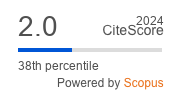Neuroenhancing Substances Use, Exam Anxiety and Academic Performance in Bosnian-Herzegovinian FirstYear University Students
DOI:
https://doi.org/10.5644/ama2006-124.269Keywords:
Performance-Enhancing Substances, Lifestyle Drugs, Psycostimulants, Anxiety, Academic PerformanceAbstract
Objective. The aim of this study was to assess the relationship between the use of neuroenhancing substances, exam anxiety and academic performance among first-year Bosnian-Herzegovinian (BH) university students.
Methods. In a cross-sectional study, an ad hoc questionnaire was delivered to a sample of BH first-year university students. The following data were collected: socio-demographic features, consumption of neuroenchancing substances, the Westside Test Anxiety Scale (WTAS) and academic performance.
Results. A total of 214 students were included. Consumption of lifestyle substances, coffee, energy drinks, nicotine, alcohol, and marijuana, for the purpose of neuroenhancement increased during the week before the exams. OTC cognitive enhancer use was reported by 31.0%, and of benzodiazepines by 1.5% of students. No psycostimulants were used. A high to extremely high exam WTAS score was reported in 38.3% students. The exam WTAS score was positively correlated with consumption of coffee (rho=0.31; P<0.001), energy drinks (rho=0.18; P=0.009), and nicotine (rho=0.22; P=0.001), and negatively correlated with last exam grade (rho=-0.33; P<0.001). The exam WTAS score was a significant independent predictor (OR=0.55; 95% CI 0.31 to 0.97, P=0.039) for self-assessed academic performance. Self-assessed academic performance was positively correlated with last exam grade (rho=0.15; P=0.043).
Conclusions. Although first-year BH university students do not seem to use either prescription or illicit psycostimulants, the consumption of nicotine, alcohol, and marijuana is worrying. However, the consumption of these neuroenhancing substances seems not to be related to better self-assessed academic performance. Finally, exam anxiety seems to be a significant problem among BH first-year university students.





